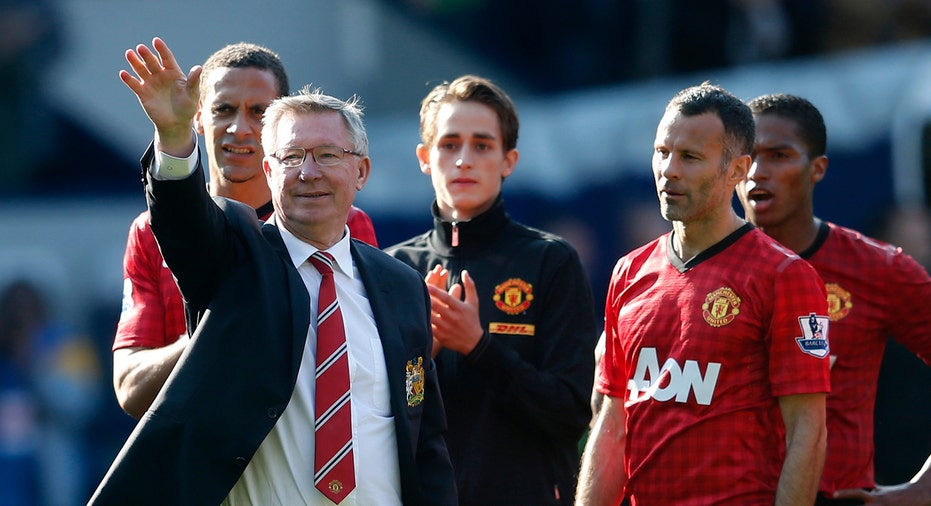Kicking Their Way to Success: How Manchester United Became a Winning Team

In August 2012, the English soccer team Manchester United (NYSE:MANU) went public, making it one of the most valuable soccer teams in the world. The team has won 20 league titles, the most of any English soccer team and is one of the highest earning teams.
For 27 years, Manchester United was led by Sir Alex Ferguson, a former Scottish soccer player who brought the team from its previous lowly ranking to being one of the best in the Premier League. His success was so great that Harvard Business School did a case study on Ferguson’s winning management style.
In his new book Leading, co-authored with the chairman of Sequoia Capital Sir Michael Moritz, Ferguson details how he turned around Manchester United.
FOXBusiness.com broke down the legendary manager’s book into 5 tips for building a winning machine:
Use Your Eyes and Ears Ferguson stresses the importance of listening and watching more than talking. He describes how after a game in 1992, he sat in the players’ bath (a move he refers to as “highly unusual”) and listened to them analyze a game and specific players from the opposing team. This analysis led Ferguson to buying one of the other team’s players. For watching, Ferguson describes the differences a coach sees when he’s on the field versus on the sidelines. “When I stepped back and watched from the sidelines, my field of view was widened and I could absorb the whole session, as well as pick up on players’ moods, energy and habits.” He credits this as being one of the most valuable lessons of his career.
Organization and Preparation Ferguson writes: “If I was starting again as a manager, the thing I would focus on the most is a player’s attitude during training sessions. If they take it seriously and have the necessary talent and determination, good things will happen. If they are inclined to slack off, they will never make it over the long haul.” He notes that all aspects of preparing for a game (including post game recovery) are essential to performance.
Teamwork Ferguson paid attention to every single detail on his team, all down to the age of the players. He tracked the various age groups, observing that the team never became too old, or too young and translated that into experience levels. And when a newbie joined the team, Ferguson made sure that he seamlessly threaded the new player in with his teammates.
Be Inspiring “You don’t get the best out of people by hitting them with an iron rod. You do so by gaining their respect, getting them accustomed to triumphs and convincing them that they are capable of improving their performance,” writes Ferguson. It’s essential to be someone that players want to play for. And Ferguson notes that trying to be “one of the boys” never works.
Fear of Failure Ferguson writes that each time he took a new coaching job, he thought to himself “I’m not going to fail here.” He notes that lost games were the result of what Manchester United failed to do, as opposed to what their opponents did. When it came to coaching after a loss, he would focus on what needed improvement.
The beneath passage is an excerpt from Leading.
"Getting an organisation into balance doesn't occur once. It requires perpetual work. I felt I was always re-tuning things--although, once in a while, we had to do more than just a simple brake adjustment and oil change. We needed to change with the times, so we did, and this occurred on a regular four-year cycle. Our squad in the early 1990s was British and muscular. By the late 1990s it had become more refined and a decade later we had a decidedly continental flair. Players like Ronaldo, Nani and Evra would have seemed like oddities in the late 1980s.
Whenever we sold popular players who were past their prime or had lost their place in the team, there would always be a lot of flak. It wasn't something I enjoyed doing, but it was just one of those ugly necessities of life. When we sold Paul Ince to Inter Milan in 1995, I got a raft of abusive letters. But what the fans did not appreciate was that I was under considerable pressure to make sure that we could make room in the side for Nicky Butt, Paul Scholes and David Beckham. Ben Thornley, another youngster at the time, also looked as if he would make it, until he was terribly injured in a reserve game. I did not want these players going to other clubs and, at the time, we were getting lots of enquiries about whether Butt was for sale...
Every member of a team has got to understand that they are part of a jigsaw puzzle. If you remove one piece, the picture doesn't look right. Each player has to understand the qualities and strengths of their team-mates. In football eight players, no11, win games, because everybody has off-days and it's almost impossible to make 11 people play to perfection simultaneously."



















